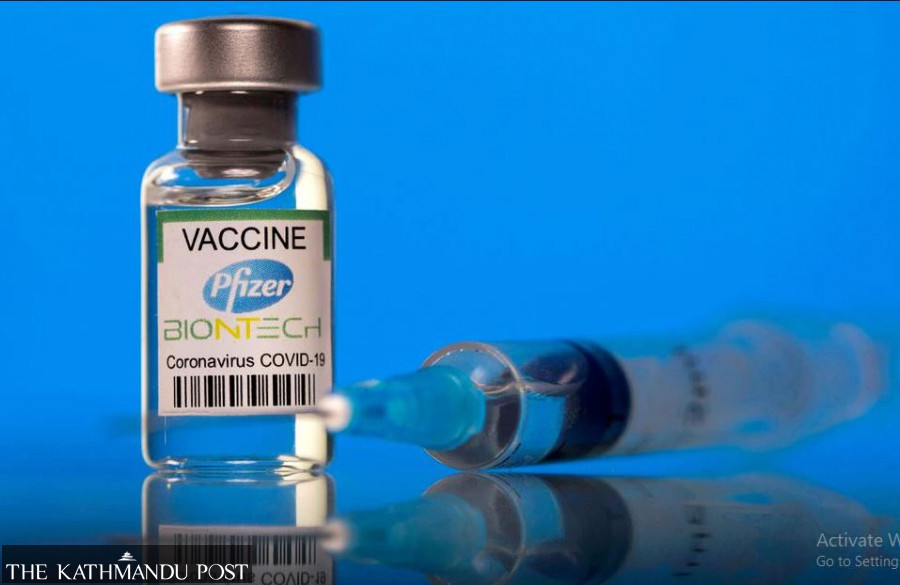Health
Covid-19 vaccine shortage delays second booster shots
Those in vulnerable groups were supposed to get their doses starting September.
Arjun Poudel
Plans to start the second Covid-19 booster shot vaccine campaign in Nepal have been indefinitely halted due to a shortage of vaccines.
Officials said the plan to administer second booster shots to vulnerable groups has been delayed due to the inability of the COVAX, a United Nations-backed international vaccine-sharing scheme, to supply the jabs on time.
“The facility offered us vaccines with a very short shelf life,” an official at the Ministry of Health and Population told the Post, on the condition of anonymity as he isn't authorised to speak to the media. “The vaccines we were being offered would expire by November-end, which we refused to accept.”
Of the 9.2 million doses of adult Pfizer-BioNTech vaccine committed by the facility, only around three million have been supplied so far.
The Health Ministry had planned to administer second booster shots to people above 60, those with compromised immunity, and health workers from September.
The decision to administer second Covid booster shots is in line with the recommendations of the World Health Organisation’s Strategic Advisory Group of Experts on Immunisation (SAGE) and the National Immunisation Advisory Committee.
“We are ready to start the second booster programme at the earliest,” said Dr Bibek Kumar Lal, director of the Family Welfare Division of the Department of Health Services. “We have been told that the vaccine doses will be supplied within the next few weeks.”
Lal conceded that the ministry did not accept the vaccine doses with short shelf lives.
An official at the Health Ministry said even though the shelf life of the Pfizer-BioNTech vaccine had been extended by the manufacturing companies and the regulatory bodies of the United States by three months, the offer was turned down due to fears of stoking a controversy.
“The overall vaccination programme would be affected if there is any kind of controversy,” said another official at the Department of Health Services. “As we are close to the parliamentary and provincial assembly elections, a controversy about Covid-19 vaccine could become a big issue.”
As the total number of people above 60, the immunocompromised, and the health workers is not big, the Health Ministry does not foresee major problems with giving them second booster shots.
Nepal started administering first booster shots in January this year prior to the WHO SAGE’s formal decision on the same. Booster shots were provided to frontline workers, including health workers, journalists, and bureaucrats during the initial stage, which was later extended to all above 12 years old.
Studies show that the immunity from immunisation or natural infection wanes over time.
Experts stressed the importance of second booster shots to those who had taken their first six months ago.
For the second booster shots, an expert panel of the Health Ministry decided to wait for the decision of the WHO SAGE meeting.
A meeting of the WHO SAGE held on August 18 supported the administration of second booster shots to certain groups, including elderly people, officials said.
“As effectiveness of the vaccine declines, older adults and people with comorbidities continue to be at the greatest risk of mortality due to the Omicron variant; even a minor decrease in vaccine effectiveness in such vulnerable persons will translate into a rise in severe disease and deaths,” reads the WHO SAGE statement. “This guidance pertains to the need for a second booster dose to restore vaccine effectiveness in the context of Omicron.”
So far, around 8 million people (or around 27.3 percent of Nepal’s population) have been boosted. Despite repeated appeals by health agencies, the uptake of booster shots has not increased significantly.
Experts say vaccination is the only reliable way to prevent severity and deaths from coronavirus infections and suggest administering second booster shots to the elderly population and those with comorbid conditions who were administered the first booster shots some six months ago.
“Authorities concerned should focus on vaccination, first booster shots and also second booster shots to the frontline workers, elderly people and those with comorbidities,” said Dr Prabhat Adhikari, an infectious disease and critical care expert.
So far, around 22.3 million people (76.5 percent of the total population) have been fully vaccinated.
Nepal has so far received around 72 million doses of Covid vaccines of various brands—AstraZeneca, Vero Cell, Moderna, Janssen, Sinovac-CoronaVac, and Pfizer-BioNTech—including paediatric doses.




 11.15°C Kathmandu
11.15°C Kathmandu















